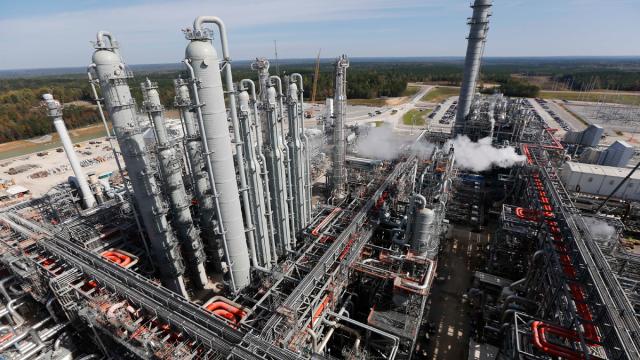With the executive branch about to be handed off to climate deniers and oil tycoons, the outgoing US administration is urging scientists to explore any and all options for combating the threat of climate change — including engineering the atmosphere to stop it.
A carbon capture plant in Mississippi, which is designed to capture CO2 from its own emissions and inject them underground for storage. Image: AP Photo/Rogelio V. Solis
Geoengineering, or hacking the climate system to cool it off, is the latest science fictional idea to make its way into a White House strategic roadmap, following a report last week on how we should be preparing for the apocalypse asteroid. Seeing as the apocalypse asteroid won’t have a chance to annihilate us if the climate spirals out of control first, it would appear the White House is trying to cover all bases.
The fact that geoengineering, a controversial subject the White House avoided mentioning for years, is now getting serious treatment in a policy roadmap is also the latest indication that Obama does not think we are acting to reduce our emissions quickly enough, and that aggressive technological interventions may be required.
The roadmap, which was submitted to Congress this week by the US Global Change Research Program, the governing body of the 13 federal agencies conducting research on global environmental change, lays out future directions of study on familiar topics, such as the rapidly-warming Arctic and humanity’s impact on the global water cycle. It also urges research into two of the most widely discussed planet-hacking concepts: Solar engineering, or injecting particles into the stratosphere to make it more reflective, and carbon capture, or sucking CO2 right out of the sky.
While the report does not suggest scientists conduct a climate experiment any time soon — solar engineering and direct carbon capture from the air are both highly speculative ideas — it recommends we start laying some groundwork, by improving models and observational capabilities that can predict the consequences of geoengineering. “Such research would also define the smallest scale of intervention experiments that would yield meaningful scientific understanding,” the report reads.
Ken Caldeira, a climate scientist at the Carnegie Institution for Science who was on a recent National Academies panel that recommended research on solar engineering and carbon capture, applauded the White House “for paying attention to what scientists are saying we need to be doing. I wish the incoming Obama Administration would have said these things 8 years ago,” he told Gizmodo in an email.
Caldeira was careful to note that the two proposed interventions are very different, and that while carbon capture bears little risk — other than potentially spending billions on a technology that doesn’t pan out — stratospheric aerosol injection “does raise a set of novel environmental risks and concerns”. Indeed, preliminary models suggest that injecting sunlight-reflecting sulfate particles into the stratosphere could alter global weather patterns, possibly impacting the monsoon rains that nourish the crops that feed hundreds of millions of people in South Asia.
“On the other hand, if climate change should prove truly catastrophic, solar geoengineering is the only known approach that can cool our planet on a politically relevant timescale,” he added.
Michael Mann, a climate scientist at Penn State University and an outspoken critic of geonengineering, had a somewhat darker view on the new White House recommendations. “I do believe it is dangerous to consider engaging in massive planetary interventions with a system we understand imperfectly,” he told Gizmodo. “The law of unintended consequences reigns supreme.”
“The one possible exception is direct air capture, a relatively benign form of geoengineering,” Mann continued. “With respect to other schemes, like stratospheric sulphate aerosol injection, the only legitimate reason to study them right now, in my view, is to get a better sense of just what dangers might result from implementing such schemes.”
Those fearful that geoengineering could spiral out of control may take comfort in the fact that Trump’s administration and Congress could choose to ignore Obama’s latest science policy recommendations. Although generally speaking, that’s not a very comforting thought at all.
